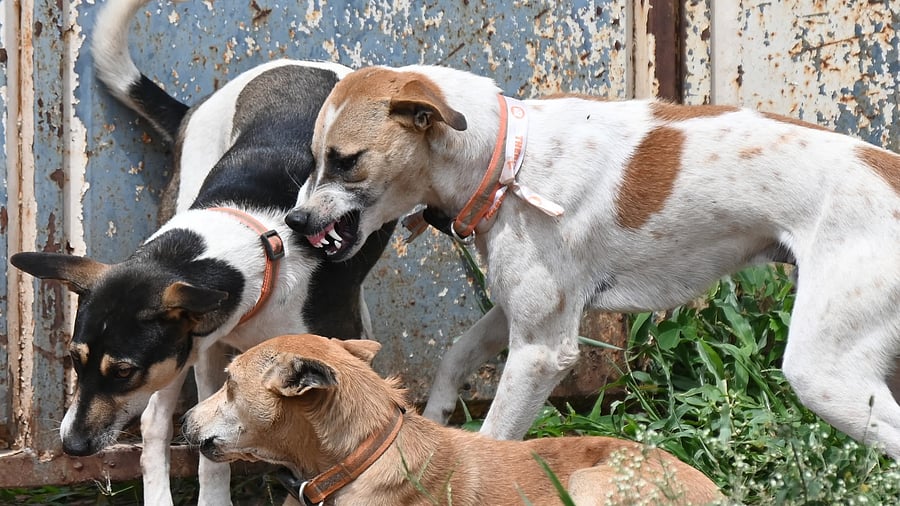
The Greater Bengaluru Authority (GBA) is now scouting for locations to set up new dog pounds and planning a slew of initiatives to bring down the rate of dog bites in the city.
Credit: DH FILE PHOTO
Bengaluru: The Supreme Court recently directed that all stray dogs in public spaces such as hospitals, schools, colleges, and parks must be shifted into shelters. While the SC is speaking about shifting a large number of dogs to shelters, Bengaluru is not equipped to house even a few hundred dogs to carry out Animal Birth Control (ABC) on a large scale.
The Greater Bengaluru Authority (GBA) is now scouting for places to set up new dog pounds and is also planning a slew of initiatives to bring down the rate of dog bites in the city. “Our first priority is to set up more centres to house the dogs, and instructions have been given to all the corporations,” Maheshwar Rao, GBA Commissioner, told DH.
At present, there are close to eight centres where Animal Birth Control (ABC) programs are being conducted, and a few other observation centres. However, Rao acknowledged that a lack of space had slowed down the ABC progress, and the authority has now requested support from the public.
“If anyone can provide us space to set up observation centres to house dogs, we can go ahead immediately. Our officials are also trying to scout suitable places,” he said.
The corporation commissioners have also asked officials to conduct a survey and identify the dogs that need to be shifted so that they can plan and set up the infrastructure required to house them.
The officials have written to all institutions asking them about the number of dogs on their premises, based on which further actions would be planned.
While the GBA is now planning better infrastructure and new initiatives, many initiatives floated earlier have remained on paper.
Earlier, the Bruhat Bengaluru Mahanagara Palike (BBMP) had announced a number of measures to reduce the stray dog menace and improve the coverage of the ABC program that helps keep a check on the stray dog population.
From microchipping the strays to track them and identify if they are neutered to community feeding initiatives that could help bring down aggressive behaviour among the dogs, the BBMP had announced a slew of measures. However, none of them have taken off.
Microchip technology is capable of storing the dog’s place of residence, date of vaccination, date of neutering surgery, and other factors. The community feeding initiative aimed at feeding stray dogs regularly. Feeding them would help bring down the aggressiveness in them, the officials had opined.
“The tenders did not receive a good response. Though we invited tenders twice, we could not get a qualified agency to take up these works. Now, the individual corporations will take over,” a senior GBA official said.
Rao acknowledged that many of these programs had hit the back burner after the GBA and five corporations took over from BBMP.
“These programs did take a back seat. However, our first priority is to implement the SC order and improve our infrastructure. We will eventually take these up based on priority,” he said.
No changes on ground
Over the last three months, the city has reported at least three incidents of dog bites and one incident of death due to a dog bite. However, even after back-to-back incidents, there seems to be no impact on the ground, and residents say they still go out in fear of being hounded by packs of dogs.
DH spoke to people from various corporations to understand if any action is taken after a dog bite incident is reported from a particular area.
“The dogs in the areas are caught and kept under observation. Many of the dogs are released back soon after testing them and checking if they are neutered. Aggressive dogs are kept for ten days,” an official from the South Corporation said.
In the North Corporation, recently, at least 40 dogs were captured after back-to-back incidents of dog bites. Asked what the dogs were analysed for, officials said that they did not exactly know how to bring down the aggressiveness of the dogs.
“We neuter them, and the hormonal changes make them a little aggressive. That apart, we are not sure what else can be done. Earlier, there were behavioural therapists who used to visit and help us understand the behaviour of the dogs. Now, however, we just try various methods we know. It’s a trial-and-error method. Many times, we just keep them under observation for 10 days and let them back,” the official said on condition of anonymity.